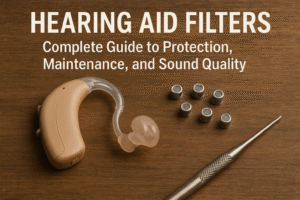
Table of Contents
Tinnitus, commonly described as a persistent ringing, buzzing, or hissing in the ears, affects millions of people worldwide. While it isn’t a disease itself, it can significantly impact daily life, sleep, concentration, and overall wellbeing. One of the most effective approaches to tinnitus management involves using hearing aids, which not only improve hearing but can also provide relief from tinnitus through integrated sound therapy.
In this complete guide, we explore how hearing aids for ringing in ears work, types of devices available, sound therapy options, and additional strategies to reduce the impact of tinnitus on your life.
Understanding Tinnitus and Its Causes
Tinnitus is a symptom rather than a disease, and it can arise from several underlying factors:
- Hearing loss – Damage to the inner ear or auditory nerve often triggers tinnitus.
- Noise exposure – Prolonged exposure to loud sounds can harm delicate hair cells in the cochlea.
- Ear infections or blockages – Wax buildup, fluid, or infections can contribute to ringing in the ears.
- Medical conditions – High blood pressure, diabetes, and certain medications can worsen tinnitus.
Professional evaluation through services like hearing tests in Cambodia and tympanometry tests ensures accurate diagnosis and early intervention.
How Hearing Aids Help with Tinnitus
Hearing aids primarily improve hearing, but they also play a crucial role in managing tinnitus:
- Amplifying External Sounds
Many people with tinnitus also have mild hearing loss. By amplifying environmental sounds, hearing aids reduce the perceived loudness of tinnitus, helping the brain focus on external noises rather than internal ringing. - Sound Therapy Integration
Modern hearing aids come with built-in sound therapy options, including white noise, pink noise, or nature sounds. These gentle background sounds mask tinnitus, providing relief and improving concentration. - Improved Communication and Confidence
Difficulty hearing can increase stress, which often worsens tinnitus. Hearing aids enhance speech understanding, reducing strain and indirectly helping tinnitus management. - Customizable Settings
Audiologists can program hearing aids to meet individual needs, balancing amplification and tinnitus-masking features for maximum comfort. Advanced solutions may include custom earmolds and fittings or BAHA devices for specialized support.
Learn more about advanced hearing solutions and fittings at Advance Hearing Center.
Types of Hearing Aids for Tinnitus Relief
Choosing the right device depends on your hearing loss, lifestyle, and tinnitus severity. Common options include:
- Behind-the-Ear (BTE) Hearing Aids
Versatile and powerful, suitable for most degrees of hearing loss and can integrate sound therapy features. - Receiver-in-Canal (RIC) Hearing Aids
Smaller and discreet, with advanced processing for tinnitus masking. - In-the-Ear (ITE) and In-the-Canal (ITC) Hearing Aids
Compact options for mild to moderate hearing loss with optional tinnitus support. - Bone-Anchored Hearing Aids (BAHA)
Recommended for conductive hearing loss; can also assist in tinnitus management by improving auditory input.
Sound Therapy for Tinnitus
Sound therapy is a cornerstone of tinnitus management. It works by introducing external sounds to reduce the brain’s focus on internal ringing.
Common techniques include:
- White Noise – Continuous soft noise that masks tinnitus sounds.
- Nature Sounds – Rain, ocean waves, or forest sounds for relaxation.
- Music Therapy – Tailored music frequencies designed to reduce tinnitus perception.
Benefits:
- Reduces perceived intensity of tinnitus.
- Improves concentration and sleep quality.
- Complements hearing aid amplification for holistic relief.
Lifestyle and Home Strategies for Tinnitus Management
While hearing aids and sound therapy are highly effective, incorporating healthy lifestyle habits can significantly enhance tinnitus management and overall auditory health. Consider the following strategies:
- Limit exposure to loud sounds – Loud music, machinery, or noisy environments can worsen tinnitus. Always use earplugs or noise-canceling headphones in concerts, construction areas, or when operating loud machinery. Regular precautions protect your hearing and reduce symptom intensity.
- Manage stress and anxiety – Stress is a known trigger for tinnitus flare-ups. Practices such as meditation, deep breathing, yoga, or mindfulness can help calm the nervous system, making tinnitus less noticeable. Stress reduction also improves sleep quality and mental wellbeing.
- Maintain a healthy diet – A balanced diet rich in antioxidants, vitamins, and minerals supports ear health and blood circulation. Limiting caffeine, nicotine, and excessive salt can also help reduce tinnitus severity in some individuals.
- Prioritize sleep hygiene – Poor sleep can amplify tinnitus perception. Establish a consistent sleep schedule, create a calm bedroom environment, and avoid screen time before bed. White noise machines or sound therapy apps can also improve sleep quality.
- Exercise regularly – Moderate physical activity improves blood flow to the ears and brain, which can reduce tinnitus perception. Activities like walking, swimming, or cycling are beneficial.
- Hydration and ear care – Staying hydrated helps maintain optimal inner ear fluid balance, while regular ear hygiene prevents blockages or infections that could worsen tinnitus.
- Regular hearing checks – Schedule routine audiologist visits to monitor hearing changes and adjust hearing aids or sound therapy as needed. Early detection of any decline ensures timely intervention.
Professional Support and Follow-Up
Effective tinnitus management often requires ongoing support from a qualified audiologist. Key aspects include:
- Regular hearing aid adjustments – Fine-tuning amplification levels and sound therapy features ensures optimal relief and comfort. Each individual’s tinnitus profile may change over time, so adjustments are essential.
- Monitoring tinnitus perception – Keeping track of symptom patterns, triggers, and progress helps audiologists customize therapy and recommend lifestyle adjustments.
- Combination treatments – For severe cases, hearing aids may be used alongside cognitive behavioral therapy (CBT), relaxation techniques, or tinnitus retraining therapy (TRT) to achieve better outcomes.
- Patient education and counseling – Understanding the causes of tinnitus, managing expectations, and learning coping strategies empower individuals to live more comfortably with tinnitus.
- Support groups and resources – Connecting with others experiencing tinnitus can provide emotional support, practical tips, and a sense of community.
- Advanced audiological interventions –Additional treatments such as cochlear implants in Cambodia or hearing aid servicing may improve hearing and reduce tinnitus perception.
By combining hearing aids, lifestyle adjustments, and professional follow-up, tinnitus sufferers can achieve long-term relief and improved quality of life.
Conclusion
Tinnitus can significantly affect daily life, but effective management is possible with the right combination of hearing aids, sound therapy, lifestyle adjustments, and professional support. Modern hearing aids not only improve hearing but also provide relief from ringing, buzzing, or hissing in the ears through integrated sound therapy and customizable settings.







